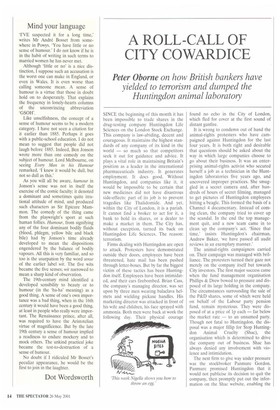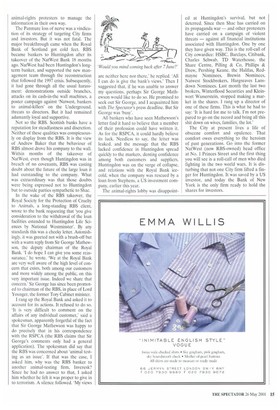A ROLL-CALL OF CITY COWARDICE
Peter Oborne on how British bankers have
yielded to terrorism and dumped the Huntingdon animal laboratory
SINCE the beginning of this month it has been impossible to trade shares in the drug-testing company Huntingdon Life Sciences on the London Stock Exchange. This company is law-abiding, decent and courageous. It maintains the highest standards of any company of its kind in the world — so much so that competitors seek it out for guidance and advice. It plays a vital role in maintaining Britain's position as a leader in the international pharmaceuticals industry. It generates employment. It does good. Without Huntingdon, and companies like it, it would be impossible to be certain that new medicines did not have disastrous side-effects: part of its job is to prevent tragedies like Thalidomide. And yet, within the City of London, it is a pariah. It cannot find a broker to act for it, a bank to hold its shares, or a dealer to make a market in them. The City has, without exception, turned its back on Huntingdon Life Sciences. The reason: terrorism.
Firms dealing with Huntingdon are open to attack. Protesters have demonstrated outside their doors, employees have been threatened, hate mail has been pushed through letter-boxes. But by far the biggest victim of these tactics has been Huntingdon itself. Employees have been intimidated, and their cars firebombed. Brian Cass, the company's managing director, was set upon by three men wearing balaclava helmets and wielding pickaxe handles. His marketing director was attacked in front of his wife and children, his face sprayed with ammonia. Both men were back at work the following day. Their physical courage found no echo in the City of London, which fled for cover at the first sound of distant gunfire.
It is wrong to condemn out of hand the animal-rights protesters who have campaigned against Huntingdon for the last four years. It is both right and desirable that questions should be asked about the way in which large companies choose to go about their business. It was an enterprising animal-rights activist who secured herself a job as a technician in the Huntingdon laboratories five years ago, and uncovered improper practices. She smuggled in a secret camera and, after hundreds of hours of secret filming, managed to get pictures of Huntingdon employees hitting a beagle. This formed the basis of a Channel 4 documentary. Instead of coming clean, the company tried to cover up the scandal. In the end the top management quit, and a new team came in to clean up the company's act. 'Since that time,' insists Huntingdon's chairman, Andrew Baker, we have passed all audit reviews in an exemplary manner.'
The animal-rights campaigners carried on. Their campaign was managed with brilliance. The protesters turned their gaze not merely on the company itself but towards City investors. The first major success came when the fund management organisation Phillips & Drew bowed to pressure and disposed of its large holding in the company. The circumstances surrounding the sale of the P&D shares, some of which were held on behalf of the Labour party pension fund, remain mysterious. They were disposed of at a price of 1p each — far below the market rate — to an unnamed party. Though not fatal to Huntingdon, the disposal was a major fillip for Stop Huntingdon Animal Cruelty (Shac), the organisation which is determined to drive the company out of business. Shac has always denied any involvement with violence and intimidation.
The next firm to give way under pressure was the stockbroker Panmure Gordon. Panmure promised Huntingdon that it would not publicise its decision to quit the company, then promptly put out the information on the Shac website, enabling the animal-rights protesters to manage the information in their own way.
The Panmure loss of nerve was a vindication of its strategy of targeting City firms and investors. But it was not fatal. The major breakthrough came when the Royal Bank of Scotland got cold feet. RBS became bankers to Huntingdon after its takeover of the NatWest Bank 18 months ago. NatWest had been Huntingdon's longterm banker, and supported the new management team through the reconstruction that followed the 1997 crisis. Subsequently, it had gone through all the usual harassment: demonstrations outside branches, attacks on its cash-in-the wall machines, a poster campaign against `Natwest, bankers to animal-killers' on the Underground, threats to directors. But it had remained adamantly loyal and supportive.
Not so the RBS. Scottish banks have a reputation for steadfastness and discretion. Neither of these qualities was conspicuously on display from the RBS. It is the view of Andrew Baker that the behaviour of RBS almost drove his company to the wall. Within months of the takeover of NatWest, even though Huntingdon was in breach of no covenants, RBS was casting doubt about the future of the large loan it had outstanding to the company. What was extraordinary was that those doubts were being expressed not to Huntingdon but to outside parties sympathetic to Shac.
In the wake of the RBS takeover, the Royal Society for the Protection of Cruelty to Animals, a long-standing RBS client, wrote to the bank requesting that 'you give consideration to the withdrawal of the loan facilities extended to Huntingdon Life Sciences by National Westminster'. By any standards this was a cheeky letter. Astonishingly, it was greeted not with a brush-off but with a warm reply from Sir George Mathewson, the deputy chairman of the Royal Bank. 'I do hope I can give you some reassurance,' he wrote. We at the Royal Bank are very well aware of the high level of concern that exists, both among our customers and more widely among the public, on this very important issue. Indeed we share that concern.' Sir George has since been promoted to chairman of the RBS, in place of Lord Younger, the former Tory Cabinet minister.
I rang up the Royal Bank and asked it to account for its actions. It refused to do so. 'It is very difficult to comment on the affairs of any individual customer,' said a spokesman, apparently forgetful of the fact that Sir George Mathewson was happy to do precisely that in his correspondence with the RSPCA (the RBS claims that Sir George's comments only had a general application). The spokesman did say that the RBS was concerned about 'animal testing as an issue'. If that was the case, I asked him, why was the RBS banker to another animal-testing firm, Inveresk? Since he had no answer to that, I asked him whether he felt it was proper to give in to terrorism. A silence followed. 'My views
are neither here nor there,' he replied. 'All I can do is give the bank's views.' Then I suggested that, if he was unable to answer my questions, perhaps Sir George Mathewson would like to do so. He promised to seek out Sir George, and I acquainted him with The Spectator's press deadline. But Sir George was 'busy'.
All bankers who have seen Mathewson's letter find it hard to believe that a member of their profession could have written it. As for the RSPCA, it could hardly believe its luck. Needless to say, the letter was leaked, and the message that the RBS lacked confidence in Huntingdon spread quickly to the markets, denting confidence among both customers and suppliers. Huntingdon was on the verge of collapse, and relations with the Royal Bank icecold, when the company was rescued by a loan from Stephens, a US investment company, earlier this year.
The animal-rights lobby was disappoint ed at Huntingdon's survival, but not deterred. Since then Shac has carried on its propaganda war — and other protesters have carried on a campaign of violent threats — against all financial institutions associated with Huntingdon. One by one they have given way. This is the roll-call of City cowardice: HSBC, Barclays, Citibank, Charles Schwab, TD Waterhouse, the Share Centre, Pilling & Co, Phillips & Drew, Pershing Keane, the Halifax, Redmayne Nominees, Brewin Nominees, Natwest Stockbrokers, Hargreaves Lansdown Nominees. Last month the last two brokers, Winterflood Securities and Kleinwort Wasserstein, stopped making a market in the shares. I rang up a director of one of these firms. This is what he had to say: 'It is hard for me to talk. I'm not prepared to go on the record and bring all this shit down on wives, families, the lot.'
The City at present lives a life of obscene comfort and opulence. That comfort owes everything to the heroism of past generations. Go into the former NatWest (now RBS-owned) head office at No. 1 Princes Street and the first thing you will see is a roll-call of men who died fighting in the two world wars. It is disturbing that not one City firm lifted a finger for Huntingdon. It was saved by a US investor, and today the Bank of New York is the only firm ready to hold the shares for investors.



















































































 Previous page
Previous page